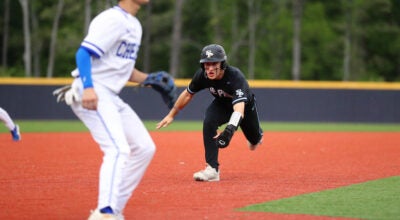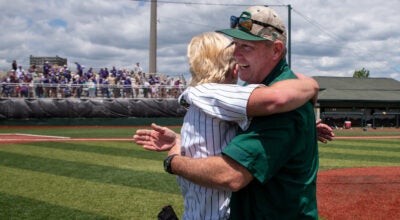Returning vets can face problems
Published 4:49 pm Wednesday, November 30, 2011
By BRAD GASKINS / Staff Writer
When Jenny Camp became executive director of the DreamPeace Foundation in April 2011, she thought she knew what to expect.
The grassroots, non-profit provides free counseling to veterans and their families. Since Camp grew up in a military family, she thought she had a handle on veterans’ issues.
She thought wrong.
“What this job has shown me is how clueless we really all are,” Camp said. “If you haven’t actually gone and been in combat, you really don’t get it. We don’t understand. We’re not going to. But we can listen, and we can start paying attention.”
Of the 14,000 veterans in Shelby County, about 3,500 – or 25 percent – are 9/11 veterans who have served in Iraq or Afghanistan. When those veterans return home, they can face many challenges.
At the very least, experts say, it will take time for returning veterans to assimilate back into the society they left behind. At the very worst, the experts say, returning veterans can suffer from post traumatic stress disorder, traumatic brain injury and have extreme trouble finding jobs.
“We as a society are not doing a good enough job of transitioning them back,” Camp said. “Most of us want to help. It’s hard to know how.”
WELCOME HOME
When veterans return home, they’re hailed as heroes for their service to their country. Parades are held in their honor. Physically, most veterans may appear fine. But mentally, all veterans have mental scars of war.
“Once you’ve been down that road, once you’ve seen the elephant, it is a hard, hard thing to go back to smoking and joking,” said Harry Moon, Shelby County’s veterans service officer. “It’s a difficult, difficult thing, and 99 percent of them never go back.”
Trying to fit back into the pre-war mold “is like trying to put a square peg in a round hole,” Moon said.
“It just doesn’t work anymore,” he added. “They feel this sense of inadequacy, or of total loss, that they can’t adapt. They feel like it’s their fault they’re not adapting, even though those around them can’t see it.”
Most veterans eventually adjust and learn to cope, Moon said. But sometimes those thoughts can come back, and veterans can have trouble dealing with them.
“Every so often it returns,” Moon said. “We have most of our problems when it does come forward. They really don’t know what direction to go in.”
PTSD AND TBI
Two of the biggest issues facing veterans are post-traumatic stress disorder and traumatic brain injury.
PTSD is a severe anxiety from a traumatic situation, while TBI affects those who have suffered brain injuries, usually from explosives such as IEDs.
“Just as 9/11 affected all of us, those of us who have been on the battlefield have seen it first hand and have lost friends,” said Chaplain Raymo, who works at the Birmingham VA hospital. “Not only physically, but we’re touched emotionally.”
Unlike the loss of limbs, PTSD and TBI and “very subtle,” according to Jeff Hester, a spokesman for the VA hospital.
“If you were in those kind of IED explosion arenas, you typically do have some kind of TBI, and you may not even know it’s affecting you,” Hester said.
Civilians can help veterans suffering from both by listening to their stories, Raymo said.
“Don’t criticize or think they’re crazy, because what they’ve seen, felt and experienced with every sense of their being has had an affect on them,” Raymo said.
Ron Jefferson got the call late one night. It was the girlfriend of a veteran suffering from post traumatic stress disorder. She wanted Jefferson, a Vietnam veteran and former Green Beret, to diffuse a situation quickly spiraling out of control.
Locked in a nasty custody dispute with an ex-lover, the young veteran of multiple combat tours had gotten loaded on vodka and strapped down with six guns.
“He gets very angry very quickly,” Jefferson said. “Put that combination with some vodka and some Red Bull, and you’ve got a problem.”
Jefferson said he quickly diffused the situation, but worries it could happen to other veterans.
“That’s an isolated situation – or is it?” Jefferson said. “If you’ve got 500 of these kids in a small community like Alabaster, or Pelham, you tell me if it’s isolated.”
JOBS
The job market is tough enough as it is, but for returning veterans it can be even more treacherous. Gone overseas for three to four years, they return home and have to compete for jobs with three to four years’ worth of new high school graduates.
“The way the economy is today, if an employer has five jobs, he can pick from 500 people. And here you are, behind the 8-ball because you don’t possess the same skills because you’ve been gone for four years,” Moon said. “You were driving tanks around for the last four years of your life. I can kill you 25 different ways, but can I program a computer?”
Veterans can bring several things civilians can’t to the job, Moon said. Veterans have strong discipline and organizational skills. Give a veteran a mission, and he or she will get the job done, Moon said.
Still, he said, it’s tough. How does a combat veteran go from fighting overseas to slinging hamburgers next to a 17-year-old kid at a burger joint?
“Not gonna happen,” Moon said. “Not gonna happen.”
Not every returning Shelby County veteran battles PTSD, has traumatic brain injury or spends years on the unemployment line. John C. Hand went back to school, got a job and, like many veterans, adjusted back into society.
Hand, now 27, signed up for the Army between his junior and senior year at Pelham High School. He served in Iraq in 2005 as a crewman on an Abraham’s tank.
When Hand returned from Iraq, he said his wife, Corey, told him he “acted like a different person.”
“It wasn’t PTSD, but I was on edge from being over there. I got over that after a few months. Even if you haven’t got PTSD or any other traumatic experiences, it’s definitely a different life. It takes some getting used to.”
Hand, who is now in the Army reserve, went back to school and graduated from the University of Montevallo. He works in corporate security but wants to transition into a law enforcement career.
When people call him a hero for his service, it feels “awkward,” Hand said.
“I hated taking that word upon myself,” he said. “I look at people in World War II, the big wars, they were the heroes. It feels awkward to me to be in that same league in people’s eyes.”
For those veterans who do have lingering mental issues, Moon said talking to other veterans is the best remedy.
“The best therapy is not sitting across the desk from a 25-year-old kid that’s never been in the military and just got his degree in psychology,” Moon said.
“It’s sitting around drinking a cold beer with a buddy – there’s no judgment there.”









